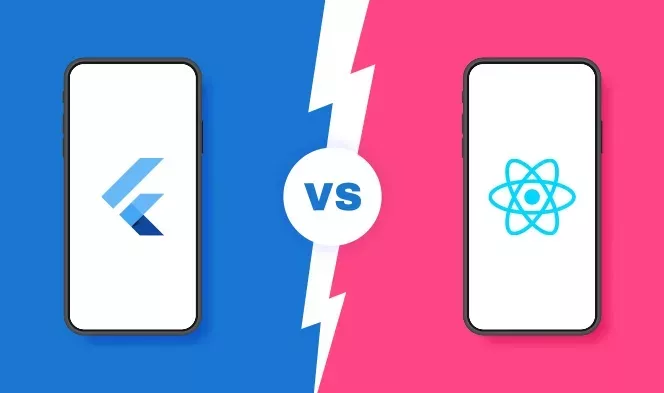1819
Flutter VS React Native App Development: Which one to Choose
12 May, 2021
10 min read
1819
12 May, 2021
10 min read

When it comes to developing applications, there are multiple options one has in the market. Today developing cross-platform applications is way easier than before because of the number of tools available. There are multiple frameworks like Flutter, React Native, Xamarin, Adobe PhoneGap, and more. But, with the increasing number of frameworks and programming languages, there is also confusion as to which one should choose.
If you are thinking of developing an application and unsure which framework is perfect for your cross-platform application development, you are in the right place. Here, we are going to talk about two of the most used frameworks for cross-platform app development i.e. React Native and Flutter. Herein, I will provide you details about each of these frameworks, their pros and cons, and which one to choose and why.
Flutter is a portable UI toolkit used to develop cross-platform applications using a single codebase. In simple terms, it is a software development kit used to develop applications easily.
Developers can easily develop intuitive, flexible, and expressive UI. Flutter is loaded with a large amount of in-built libraries and widgets; it helps to make the development environment faster. The best part of Flutter app development is the ease it provides developers to develop applications and works like native applications.
Flutter is free and open-source technology which makes it a go-to solution for developing applications. Moreover, Flutter uses Dart programming language, which is object-oriented and easy to learn. Because of the in-built widgets, app rendering is faster and has a great look and feel.
Google developed and launched Flutter in 2017 intending to provide users ease to develop applications and launch it. Today, it is one of the fastest-growing frameworks and Dart is the fastest-growing programming language. According to research by Statista, Flutter is the second most popular framework to develop cross-platform applications.
With the latest release of Flutter 2, they now support developing applications for different operating systems like Microsoft, Linux, iOS, and macOS. Additionally, it even aims to provide better experience to web browsers like Chrome, Firefox, Safari, and Edge. You can also use Flutter to develop applications for cars, TVs, and smart home appliances.
Read also: Flutter BLoC Tutorial
Pros:
Cons:
React Native is an open-source mobile application framework that uses JavaScript. It is useful to develop applications for both Android and iOS using a single code base. Similar to widgets in Flutter, React Native uses Components to make the development process easier.
The applications developed using React Native apps have similar performance and UX of native apps, which helps in providing users with a better experience.
Developers can easily develop flexible, interactive, and intuitive applications using React Native. Facebook owns React Native and revolutionized the way developers develop cross-platform applications. According to research by Statista, React Native is the most popular development platform to develop cross-platform applications. Roughly we can say that React Native powers every second application we see.
Today in the developer circle, React Native has one of the largest communities and provides large resources to learn. There are tons of resources available like blogs, tutorials, videos, monthly and yearly conferences, and constant updates from Facebook, making it better. As React Native is open source and easy to learn, you will easily find many React Native developers.
Going further, let’s see the pros and cons of React Native application:
Pros:
Cons:
Both the frameworks are best in their way and serve a purpose, i.e., to ease the development of cross-platform applications. Depending on your apps’ requirements you need to decide which framework you prefer. Consider parameters like users’ requirements, app functionalities, current market trends, discuss with your team members, budget, and more before taking the final decision.
The demand of responsive applications and frameworks has increased the demand of different frameworks. And to fulfill this demand, companies have played a major role in the developer community. Both Flutter and React Native serve a purpose and have matured a lot over the years. If you are still confused and need expert advice, you can reach out to us, and our developers will help you. Depending on your requirements, our experts will help you decide whether Flutter app development is better or a React Native app.
All product and company names are trademarks™, registered® or copyright© trademarks of their respective holders. Use of them does not imply any affiliation with or endorsement by them.

Development
Laravel
128
By Devik Gondaliya
22 Aug, 2024

Development
Devops
125
By Biztech
20 Aug, 2024

Javascript
248
By Devik Gondaliya
13 Aug, 2024